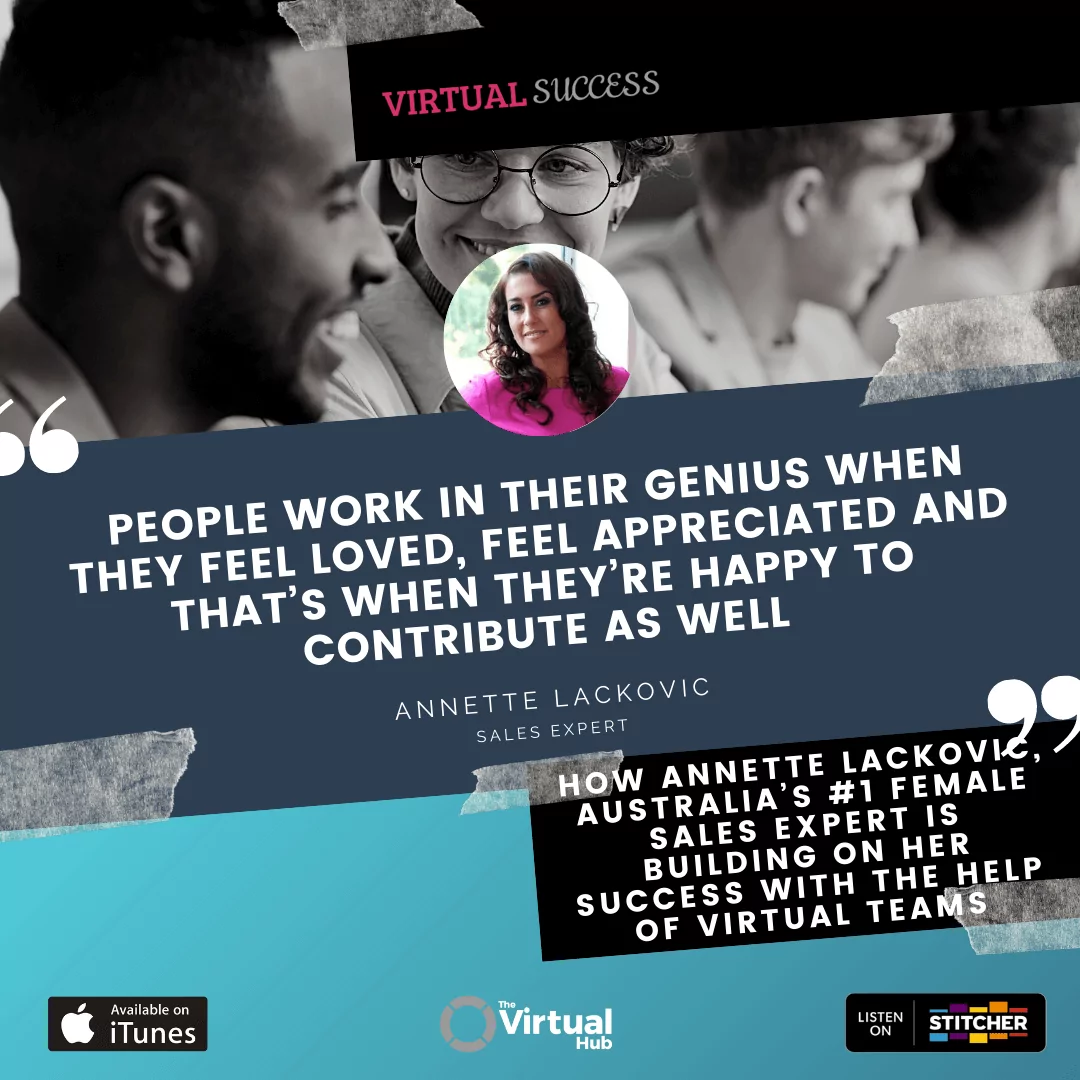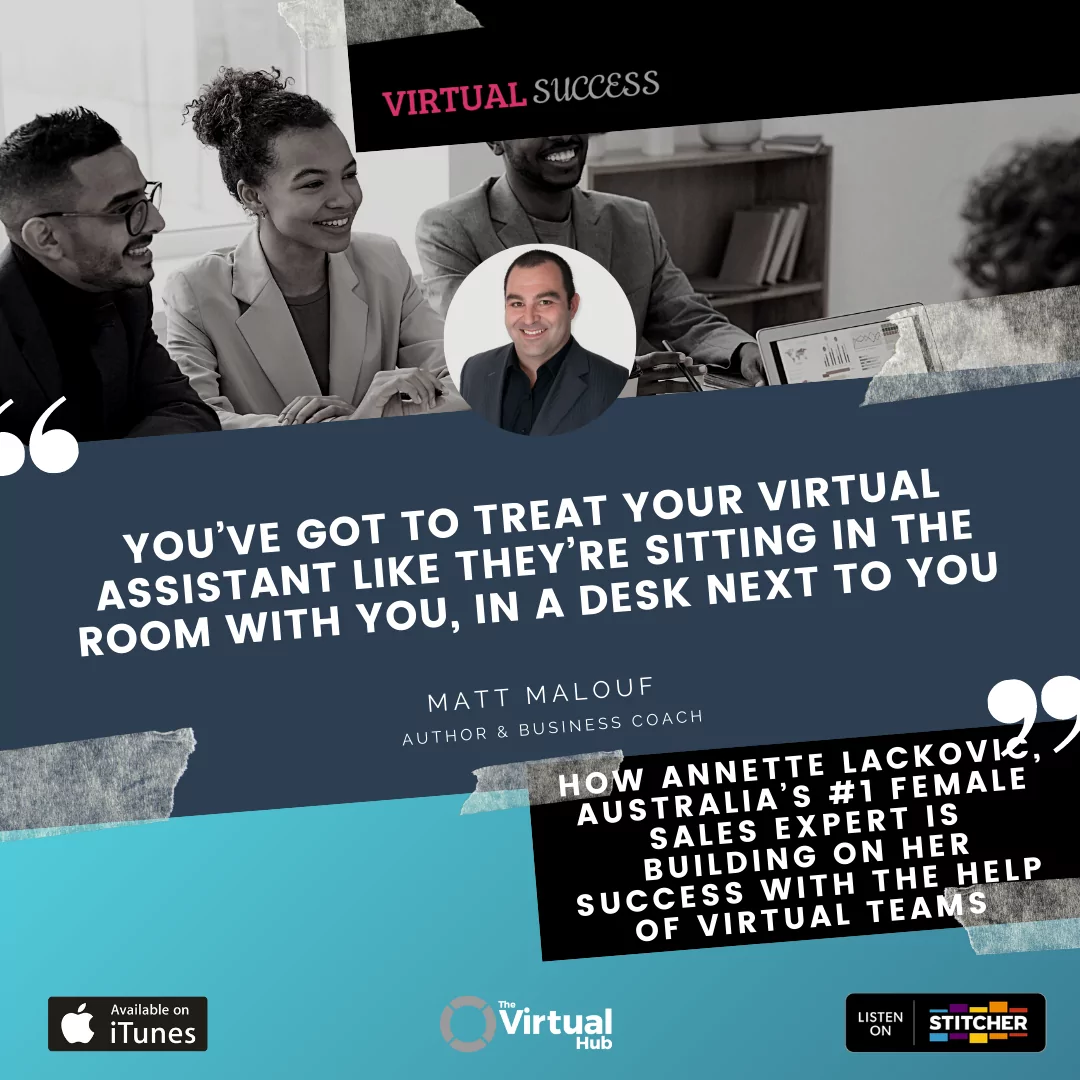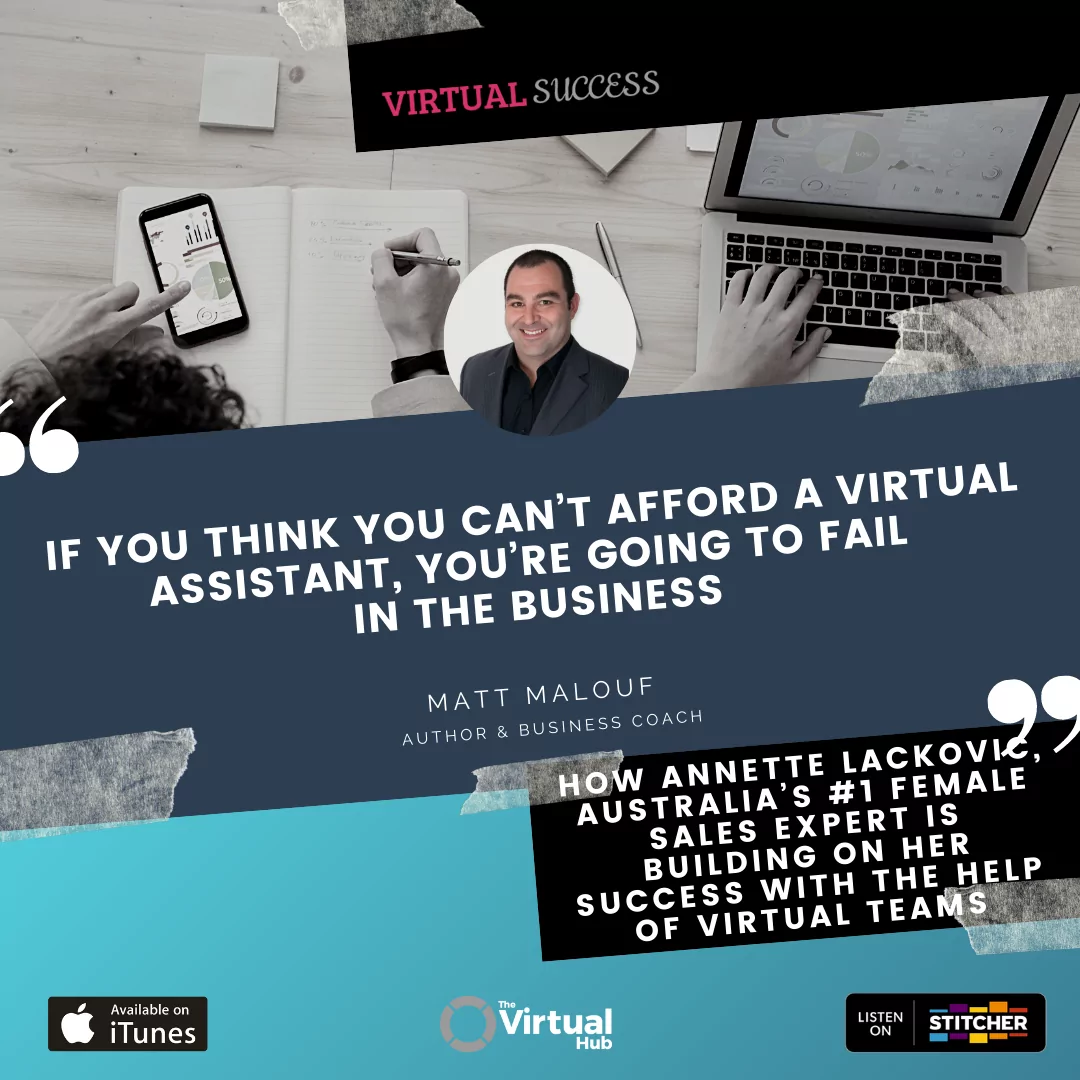How Annette Lackovic, Australia’s #1 Female Sales Expert Is Building On Her Success With The Help Of Virtual Teams
Want the transcript? Download it here.
In this episode, special guest Annette Lackovic, Australia’s #1 Female Sales Expert, shares her first-hand experience in working with virtual teams and how they have contributed to the growth of her business.
This episode is full of insights and tips from Annette on how to overcome some of the common traps entrepreneurs can fall into when onboarding new virtual team members.
Some of the areas she covers are:
- Why perseverance is key in those first few weeks of having a VA?
- Why it’s important not to shy away from those ‘tough’ conversations?
- Why open and honest communication is pivotal in building a solid working relationship with your virtual teams?
- How important the connection is that you have with your virtual team and ensuring there is an element of fun in your work day?
- Understanding your VAs skills and passions and fostering these to help them grow within your business, and ultimately grow your business?
- Why it is important to take the time to train your virtual team from the outset, to remove any unrealistic expectations you may have of them and their abilities, and vice versa?
- When’s the right time to bring a VA on board part-time vs. full-time?
- Why you really can’t afford NOT to have a VA?
Let us know what your key takeout has been from this episode and join the continuing conversation over in the Virtual Success Facebook Group.
In this episode:
01:24 – Perseverance is key
05:33 – Tough conversations
06:33 – Open and honest communication
09:05 – Let’s have some fun
10:45 – Helping your VA grow in the role
15:30 – Avoiding unrealistic expectations
19:10 – Part-time vs. full-time
23:28 – You can’t afford NOT to have a VA
27:00 – Wrapping things up
Barbara: Hey everyone and welcome back to another Virtual Success Show! Matt, how’s it going?
Matt: Going well and yourself?
Barbara: Great, thank you! Another fantastic week as always, you know, learning virtual success with my teams.
Matt: It’s always an interesting week, isn’t it?
Barbara: It’s a journey! It’s a journey. And look, I’m actually really excited about today’s show because I have one of my favorite people on the planet on the show. Annette Lackovic, welcome to the show!
Annette: Thank you! Favorite people; I love that.
Perseverance is key
Barbara: You do, you like that a lot especially on social media. Annette, I really wanted to get you on the show because as you and I both know, your virtual assistant was one of the first that we placed at Virtual Angel Hub when I started the business and what I just love, and what I want to share this story with the listeners, was that we got this VA and I was really excited about this particular person because I thought she was perfect for Annette and so she started working with Annette and within, I think it was week 2, maybe week 2 or 3…
Annette: I think week 1 or week 2 (*laughs)
Barbara: An email comes through from Annette to me and there were probably a couple of expletives in it. There were a couple of words in capital and I think, as I recall, something like ‘she’s so not worth the money’ things like that. So it basically wasn’t going well, it wasn’t a good email.
Barbara: It wasn’t a good email but you weren’t having a good experience, let’s be honest and this is something a lot of people face in those first few weeks of working with a VA but the good news is that now, you and gorgeous Gemely, absolutely adore each other, work really well together and you’ve made the relationship really work. So I really wanted to talk to you about, first of all, how you got through those first few weeks, how you went from failure to success, I guess. Maybe to kick things off, just tell us about that first day, you know the first week when you met.
Annette: The hardest bit is most entrepreneurs, we need somebody in our business because it grows, and we tend to put them in at the wrong time, it’s when we’re busy. And that’s what happened with Gem and I did make the fatal mistake even though I knew that you just can’t expect them to just run with the ball right away. I thought a week would be enough, and it wasn’t and I really wanted her to run with the ball and things weren’t happening fast enough. And because I had so much on; I did know that I’m the one who needs to train her up, I think this is the hard bit, you’ve got to train that person up whilst you’re trying to do your job and you feel like you doubling up. But what happened after that first week and I sent you that email, I’m a very open communicator so I also said to her, ‘this is not working the way that I want it to. I really need you to work and get these tasks done quicker, get these task completed quicker.’ And she said, ‘Don’t worry, this is not how slow I like to work either, I’d like to work much more efficiently.’ So it was great for her to confirm that.
Barbara: Pause there for one second because what I’ve noticed people doing and I’ve seen this happen a lot, you’re quite direct and I think a lot of people shy away from the direct conversation because they confuse a direct conversation with being mean and often I see people wanting their VA to like them and think that they’re nice. So they avoid being direct and just be honest, open and honest in what they need to feel supported by their VA.
Annette: Well for me, it’s always, a person cannot improve themselves if they don’t know what’s going on, and it’s vice versa. For me, I know that I had to be more patient and I just loved your response because you said, please just give it one more week, because I think you knew that it was just in that time of when Gem is about to peak and go into that she understands the business, she can now run with the ball but I was just in that teething stage, so just when you said that, I said ‘Okay, I’m just going to hang in there’ and with her response as well saying, ‘Don’t worry, I don’t want to work like this either. I like to work faster’, that just reassured me so much that ok great, she’s open to feedback and she’s wanting to grow as well, so it was just a perfect fit.
Tough conversations
Barbara: Ok great, so you had that conversation, actually how was that conversation? Did you feel uncomfortable, were you feeling icky about it? I mean you’re pretty good at this stuff but some people feel icky about the conversation.
Annette: No, I didn’t!
Barbara: Good!
Annette: But I did dodge the verbal conversation and I did write her an email. So I did probably what other people do now, which is they don’t pick up the phone (*laugh) … I did write it so wasn’t an attack, and I think that’s what’s really important. Sometimes you can write things in haste, like my email to you, and because I know she’s not going to perform at her best if she feels like she’s going to lose her job. I know that she’s not going to perform any better if she’s scared. So, I think from memory I wrote it and then went right, let me just clean up the language a little bit. (*laugh)
Matt: Annette can I ask a question? Was it just the speed of which she was doing things or was she not doing the right tasks?
Open and honest communication
Annette: Yeah, it was the speed and then eventually it was into the tasks, and that was part of me being her boss in a way, just getting her to understand my priorities. It was really just the speed of things, just learning to do things. I just thought that she could run with the ball quicker. There’s different behavior styles and Gem is a perfectionist at heart and she does like to get things right and I just had to understand that she doesn’t want to do something unless it’s 100%.
Later on, it was the prioritization but then I just knew that, whenever there’s errors that show up we have to understand as business owners because normally its a lack of communication. So if we have not gone through and said this is the most important thing that gets done. When an email comes through with this, or this is in your tasks I’ve gone onto Asana, and that was thanks to Barbara who introduced me to that as well, but she understands what’s the priority, the highest priority and then some of the other things like graphics, that type of stuff, I call it the fun work, gets done later.
My success honestly with her has been, I think, through two things. One is really forming that relationship with her like she is a proper physical employee, she feels a part of the team, we talk every day, we have fun, I always give her recommendations in what she needs to improve on but I always, always comment every day on something she’s done right because I know, and this is what I was saying before to you guys is, a person cannot perform well if they’re scared, if they’re nervous or if they’re, you know, scared of walking on egg shells, that they’re going to rub you the wrong way. People work in their genius when they feel loved, feel appreciated and that’s when they’re happy to contribute as well. So for me, every day I’ll always find something that’s truthful to compliment her on so she feels really good in her position and then when there’s a recommendation, it lands better and she feels safe so I feel like that was one of the big things that I really needed to embrace.
Let’s have some fun
Barbara: I really feel that is so important and I think with an awful lot of people, what I notice is people don’t realize is actually how pivotal and how important the relationship is that you have together because all the other stuff you kind of teach, but if you don’t gel and…you actually you have to invest time in that relationship as well and the fact that you say you speak to your VA every day, I speak to all of my VA’s everyday too. There are some people that are too busy for that of course but you still have to setup times where you talk, have meetings and then you also need time to have a little bit of a joke together and a little bit of a chitchat, you know.
Annette: We love the little pictures on Skype, you know the little icons you put in. Sometimes we have the little Michael Jackson dancer and it’s just fun. You know, you might smash out a task, we’ve both achieved it and it’s so important and my behavior style as well as Gem’s, we’re a good match with that. We’ve got to have a little bit fun in the day. And you know there’s days when we’re doing launches and we don’t get to talk much and we’re just smashing out a whole heap of tasks and we just know that at the end of the day we do the wrap up. But I find with that connections side of it, Barbara, is having her feel that she’s appreciated, I find what I always have with her is there’s times we’ve actually smashed out, and I mean smashed out the most ridiculous amount of project launches, we’ve done 3 launches in 2 months. This is what people probably do in a year.
Helping your VA grow in the role
Barbara: And can I also mention there, because I know your business and I also know Gem your VA. She also did not have experience with product launches so she was not experienced in that area and for her to rise to that level so quickly you know, really is a testament to you as well because you’ve taken her there on that journey and you haven’t expected her to just be like that on day one and to get there by herself. You’ve taken her on that journey with you.
Annette: Yeah! With Gem, I actually asked her, I noticed that sometimes she was doing it and this is what Matt was saying before about the priority of tasks. Every now and again when I had to have the conversation, and this was right at the start, she’d start sending some graphics through, I didn’t even ask for it, might’ve been my signed off logo. It was just like all these different things, this is where we can book and she’s making these pages all pretty and I thought, that wasn’t really in the task to do and then I said to her ‘What are you really passionate about?’ and she said, ‘I really love doing graphic design.’ And I thought, ‘No joke!’ (*laugh) so I actually thought, well whenever I have some graphics to do if we have the time, I’m going to get her to do that first, to have a go at it just to help grow her passion and her skill because you know, as my business grows there’s going to be things to fill different spots and she’s done amazing! She’s done all the graphics for all my launches for the past 3 launches and what I was saying was because of that, that feeling of that connection, and feeling like they’re part of something, they’re part of the team, they’re not just a virtual assistant, they’re actually a part of something bigger. You know she worked an extra 3 hours late at night and we had all this stuff we had to actually get out, no timeframes around it but then it’s how do you repay them as well.
So for me, we worked so hard, the next day I gave her a surprise, and I said ‘There’s no work today, and there’s no work on Monday!’ and its just how can I reward her for putting in that extra time and not complaining, not saying ‘I have to clock off at this time.’ I think that’s the difference of building a culture within your virtual business as well.
Barbara: Yeah, a couple of things I’ve noticed you saying that, is and what you mentioned about the fun element earlier, is that obviously when you’re paying for a staff member, you want to get the most out of them. But I see people making the mistake sometimes sort of treating them like a lemon to be squeezed down to the last drop because they want to get the most out of the time that they have with this VA or whatever. It’s okay sometimes for 2 hours you kind of did nothing and had a joke on Skype and do a new image, or I don’t know, have a chitchat about the future of the business, whatever, because I do that all the time. I think that is…actually if I could say the secret of my success has been to have those down times together as well.
Annette: Yeah, yeah. And they’re not machines, they are human beings like us. We all need that breather, absolutely. Like I said, that fun, there is scientific proof about the expansion of the mind and the opening of learning and the feeling of security, when you do have fun and if you don’t have that connection with your team at the moment, you’re actually doing yourself and your business a disservice.
Barbara: Absolutely! So Matt, I’m sure you’ve got some insight to bring in here and some questions for Annette, I’ve been completely monopolizing the time here.
Annette: Yeah, we’ve just been chatting away here, sorry Matt.
Matt: It’s ok guys, so I just went and grabbed a coffee and came back and you guys were still going, unbelievable!
Barbara: Women, you know!
Matt: You know, I’m so aligned with everything you’ve been talking about and that’s what I actually teach. You’ve got to treat your virtual assistant like they’re sitting in the room with you, in a desk next to you and so I can’t emphasize that point enough. I’ve got a question though, which is, sorry I’ve got 2 questions. How long have you and your VA been working together now?
Annette: hmmm, I don’t know how long?
Barbara: I think the beginning of March, March/ April; and so we’re now in November, so 8 months or something.
Annette: Wow, that’s gone fast!
Avoiding unrealistic expectations
Matt: So, if you look back at that initial part, were your expectations unreasonable? Did your VA promise something that they didn’t deliver in the initial phase, like being more efficient? Or was it that your expectations were unreasonable?
Annette: It was my expectation. And do you know Matt, this is what it was. I’d had a virtual assistant before and she ended up being an entrepreneur herself and had grown her own business so I had to then re train somebody new and I comprehended that it’s going to take me a month to train her up. I even tell my clients that, but then when it came down to the crunch and it was a busy time so I had the pressure on my shoulder, yeah, I cracked. It was just I forgot what I knew and my expectations suddenly just fell away and just yeah, put the pressure on. Unfortunately.
Matt: Yeah and I think that’s the point like when you’re onboarding your virtual assistant, it’s like any other employee that you’re bringing on locally or virtual, you’ve got to give them time to learn their role, time to learn how to work with you, time to, if they are a perfectionist, time learn how to perfect what is it that they are doing and when you give them that space and when you’re clear on your expectation from the start, I think the relationship starts working a lot sooner.
Annette: Yeah, I think, like you’re saying, the time to learn the business as much as to learn to work with me. Even today, even this week, it’s still having her understand some of the language because I teach sales, I teach a reverse sale so I teach ‘how do you get the customer to feel inspired to buy’. So it’s all in the language. So, there was one thing I got her to tweak on a lead page and I noticed that just some simple language – how would you like to pay for that – and pay is like the F word for me, and I was like, ‘Okay, cool! She doesn’t actually understand that,’ so which option would suit you best. So I got her to understand some language and that’s what’s important as well is the time to learn the business because we’re in our businesses so much and we think it’s just so easy for someone to grasp but it’s not, it’s that whole expectation thing that you’re saying Matt. There was nothing that she came to me saying this is what she can do and let me down, it was me really letting her down with expecting her just to pick everything up and run with it.
Barbara: Annette, actually how do you feel now when you think about Gem?
Annette: I love her!
Barbara: Because I know I feel this way with my team as well. When you watch them grow and they grow with you and you see them achieve. I mean it is the most uplifting feeling ever and I know that you feel that way about Gem as well; watching her grow is part of the joy.
Annette: And for her to acknowledge her growth as well. She’s done so much visual marketing for me and I wanted to show her family what she’s done. I said, ‘Have you shown your family what you’ve actually created? Before you started with me, this is just something you liked to do but look what you’ve actually done. A marketing campaign!’
Part-time vs. full-time
Barbara: You may not actually know, when we first got her we didn’t realized that was a skill set that she was actually hiding. That was a little hobby skills set that she had that you’ve really developed in her and it was just by asking the question and allowing her to play in her genius zone, I guess. The other question I want to ask you is, you started out with her part-time and then you very quickly moved to taking her full-time and I want to know your view, because I have a view on this around, I took full-time staff straight away because I wanted them in my business. What’s the difference between having someone part-time and full-time, what would you say?
Annette: Everything! Look, I feel like the reason why everybody that takes part-time first thinks that they don’t have enough work to get covered, or they’re working with a tight budget and they need to understand, and understand pretty quickly, that their time per hour is much more valuable doing the task and will bring a lot more money for that business. So for me now, having her fulltime is just as invaluable, just on so many different levels. I can depend on her, I can rely on her, she’s that support system, she keeps the business going when I can’t be there. It is such a big difference from part-time to full-time and I understand why people do take that part-time jump because I’ve been there twice in the past, and it’s then being honest with yourself and saying really is this something that I’m doing to make your sales. Am I really doing this to dodge really growing my business and having more face to face conversations, or holding more webinars, or am I just doing this because I’m just penny pinching and really not committed in growing my business to that level. As soon as you take that jump, back yourself to say, ‘I’m growing my business, putting that VA on that you have part-time to full-time’, is where you’re really showing that commitment to yourself as well and how serious you are with that business growth.
Barbara: Yeah, because I get asked that one a lot actually, when is the time to go full-time. I mean I’ve always been of the view, financially sometimes people can’t do it but I went full-time straight away from day one with my business with a VA. I made that decision, in fact, I made the decision not to buy certain you know online programs and coaching things and all that because I thought, well I need someone to work alongside me to implement stuff. And the interesting thing, and I didn’t know that this was going to happen when I first made that decision, with my first VA, it was Melanel Lawa and we affectionately call her Lala, and she is now Head of Operations for the entire Filipino entity for Virtual Angel Hub. Now you know I am just so proud of her because she’s gone from being a VA to like accidentally ending up in an amazing role that has benefited her and her family massively, the opportunity came along. Really when I launched Virtual Angel Hub, the only person who could really step into that role quickly was her because she had worked with me for so long. And I still had to grow her in that role and I still mentor her in that role but the reality was that I had someone ready, who had been working with me for so long already and she was the perfect transition so I didn’t have to go through the pain of hiring someone.
Annette: And I think that goes in line with what you were talking about before is, for us being a business owner and seeing them have that growth, I think what’s also important is if you’re really serious about scaling your business and growing it, it’s understanding that these virtual assistants for that retention, you’ve done all this work and they’ve done all the work too in learning your business and moving through it, do we actually have a growth path for them? Do we actually see what really sets them alive and also show them what’s available in the future because just like us, they’re real people and I think that retention and for them to see the vision and find out what they actually want in the future is aligned and we just help them grow into that person, like you have with, what was her name, Lala?
Barbara: Yeah, Lala!
You can’t afford NOT to have a VA
Matt: And I think a couple of things to add here, I think number one is if you’re listening to this podcast and you think you can’t afford a virtual assistant, you’re going to fail in the business in my opinion because everyone can afford a virtual assistant.
Barbara: I’m glad you said it Matt because honestly I hear this all the time and I go you can’t afford not to have one, honestly if you can’t afford one, you need to rethink your business model.
Matt: Yep, 100%!
Barbara: You can’t afford not to!
Matt: You can’t afford not to! That’s the reality, in particular you know when you’re setting goals and targets, if you work out your hourly rate, what you’re investing in the person to come on and take a lot of these lower value tasks, important but lower value in what the investment to get them done is, it’s just phenomenal and I hear it day in, day out as well. So, I do have an opinion around the difference between part-time and full-time and I’ll add another one which is around project-based. I think there’s certain tasks that you can just outsource on a project-to-project basis and doesn’t require a fulltime virtual assistant to be there on call to do that. I think one thing that you just need to align with this is the organizational chart of your business and looking at, because we’ve got some roles in our business that are only 25-hour a week roles. But we consider for that role 25 hours to be full-time and that fulfils that part of the business. So I think you just need to overlay your organizational chart to this decision and understanding what the requirements are for specific roles because that will help you assist you in decision making of part-time vs. full-time. But if this person is your right hand or left hand person, your assistant, they’re there to assist you, day in and day out; they must be full-time in my opinion.
Barbara: Yeah, I would agree with that!
Annette: And I do remember that you were talking about the project based VA’s as well, Barb, from the very start and just hearing Matt say that again it’s pricked up my ears because it’s something that we probably need to, you know, bring in to our business.
Barbara: Well interestingly the reason, you know, when I first launched Virtual Angel Hub it was all about getting VA’s, dedicated staff into businesses. And what I’ve noticed and we’ve really started to build out now is we’re starting to build the, as part of the hub, we have the experts that you can actually tap into so for example, people who are trying to get their VA’s to build websites for them and I was kind of saying, ‘Look! They can do a little bit of WordPress, but they’re not going to be able to build a whole website for you.’ But we now have a web team that people can tap into on a project basis. We’ve got video editors, we’re bringing in copywriters because those are the project-y type things that you need and I guess I’m trying to build a one-stop shop where people can just get all the things they need and their VA can help the project management for them then.
Annette: I’d love a podcast on that, please!
Barbara: I will talk to you about that and Matt and I can put it together.
Annette: I love it.
Barbara: So Annette—
Matt: You go Barb.
Barbara: So, you know, Annette, I just firstly want to say, you know, congratulations for getting through that first few weeks because I remember we chatted and it was stressful for you. But it’s not as easy as people think and so many people give up in that first 6 to 8 weeks and I call it the critical 6 to 8 weeks; that you’ve got to dig the heels in and you put the work in and sometimes the work load will double before it halves.
Annette: Yeah!
Barbara: Go ahead, Matt!
Wrapping things up
Matt: I just want to say, if knowing what you now know, if there were three critical points that you would share with the listeners today on that success with your virtual assistant, what would the three critical points be?
Annette: I think the first one is, they really need to be able to connect with that business. We need to take that time to help them understand, take them on the journey so they actually know what their vision of your business, maybe where you’ve come from and for me one thing that was really important was the way that she communicates with my customers. The second most critical thing is, the connection between myself and her to make her really feel like she’s a part of something, she’s a part of the team, she’s feeling loved, appreciated and that makes her more open for feedback. And the third thing, I think just the patience, like if I could rewind time and say to my old self even though I knew that, I comprehend it before I started that there was going to be that teething stage but when I was in the middle of it, my patience just, I lost focus.
Barbara: You’re only human, I think we all do, that happens to me with my teams too. What about the project management tools and the more, you know, getting your task lists right? Would that be something that you’ve…
Annette: Actually yeah! The accountability, so learning the prioritization and then using something like Asana, which you’ve introduced me to, so she actually knows the task and it’s just easy. You can bang everything out, you’re not sort of going back and forth on emails which get lost or via Skype. There’s just so much back tracking that happens if it’s through that but the accountability side of it through some type of system really helps with those tasks and the projects.
Barbara: Yep great. Annette, thank you so much for joining us on the show.
Annette: My pleasure!
Barbara: I’m so excited to get your insights also because we haven’t really had this conversation since those initial days. How did you go from that to success, it’s really a testament to your, to the growth of your business. I have seen your business grow since you’ve taken Gem on. I’ve seen massive things come out!
Annette: Yeah! I wouldn’t have been able to do half the stuff without her definitely! Thank you so much for helping me share the message of my journey.
Matt: Yeah, thank you.
Annette: I hope some of your listeners have taken some (*laugh) great points on what to do and what not to do.
Barbara: I hope the listeners, you know, if you know other people who are trying to get success in this area then please share the show with them because we’re really committed on this show to not just talking about why you should engage virtual teams but how to get success with virtual teams. Because that’s really the area that both Matt and I really feel is lacking in the market that nobody’s really talking about. So, this is the show!
Matt: This is the show!
Barbara: Right so until next week, Matt see you next week! Annette talk to you soon.
The Hosts
 Matt Malouf
Matt Malouf
Matt Malouf is a passionate business coach, speaker, author and entrepreneur on a mission to help entrepreneurs around the world break the shackles of mediocrity and reach new levels of personal and business success.
 Barbara Turley
Barbara Turley
Barbara Turley is the Founder & CEO of The Virtual Hub, a company that specializes in recruiting, training, and managing superstar ‘Virtual Assistants’ in the social media, digital marketing, and systems automation space.




 Matt Malouf
Matt Malouf Barbara Turley
Barbara Turley